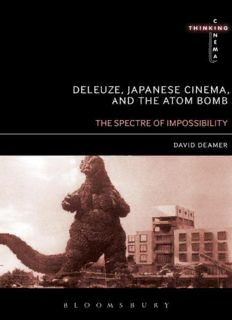
Deleuze, Japanese Cinema, and the Atom Bomb: The Spectre of Impossibility PDF
Preview Deleuze, Japanese Cinema, and the Atom Bomb: The Spectre of Impossibility
Deleuze, Japanese Cinema, and the Atom Bomb Thinking Cinema Series Editors David Martin-Jones, University of Glasgow, UK Sarah Cooper, King’s College, University of London, UK Volume 1 Deleuze, Japanese Cinema, and the Atom Bomb Deleuze, Japanese Cinema, and the Atom Bomb The Spectre of Impossibility David Deamer Bloomsbury Academic An imprint of Bloomsbury Publishing Inc 1385 Broadway 50 Bedford Square New York London NY 10018 WC1B 3DP USA UK www.bloomsbury.com Bloomsbury is a registered trade mark of Bloomsbury Publishing Plc First published 2014 © David Deamer, 2014 All rights reserved. No part of this publication may be reproduced or transmitted in any form or by any means, electronic or mechanical, including photocopying, recording, or any information storage or retrieval system, without prior permission in writing from the publishers. No responsibility for loss caused to any individual or organization acting on or refraining from action as a result of the material in this publication can be accepted by Bloomsbury or the author. Library of Congress Cataloging-in-Publication Data Deamer, David. Deleuze, Japanese cinema, and the atom bomb : the spectre of impossibility / David Deamer. pages cm. -- (Thinking cinema ; volume 1) Includes bibliographical references and index. ISBN 978-1-4411-7815-2 (hardback) 1. Motion pictures--Japan--History--20th century. 2. Nuclear warfare in motion pictures. 3. Motion pictures--Philosophy. 4. Deleuze, Gilles, 1925-1995. I. Title. PN1993.5.J3D43 2014 791.430952’09045--dc23 2014004627 ISBN: 978-1-4411-4909-1 Typeset by Fakenham Prepress Solutions, Fakenham, Norfolk NR21 8NN in memory, Lee for Jill and Nyah Contents List of Tables ix List of Images xi Acknowledgements xv Introduction: Event, Cinema, Cineosis 1 1 Special Images, Contingent Centres 31 Movement-images: Bergson, sensory-motor process The Effects of the Atomic Bomb on Hiroshima and Nagasaki (1946); Children of the Atom Bomb (1952); Godzilla (1954) 2 Horizons of History 75 Action-images: Nietzsche, history Terror of Mechagodzilla (1975); Lucky Dragon No. 5 (1959); Barefoot Gen (1983); Nausicaa of the Valley of the Wind (1984); Akira (1988) 3 Traces: Symptoms and Figures 121 Impulse-images and reflection-images: Peirce, semiosis The Naked Island (1960); Dead or Alive (1999); Ring (1998); Kwaidan (1964); The Face of Another (1966); Navel and A-bomb (1960); Tetsuo (1989); Face of Jizo (2004) 4 Consummation (and Crisis) 171 Mental-images: Bergson, memory I Live in Fear (1955); Rashomon (1950); Dreams (1990); Rhapsody in August (1991) 5 Impure Anarchic Multiplicities 217 Time-images: Deleuze, syntheses of time Casshern (2004); The Pacific War (1968); A History of Postwar Japan as Told by a Bar Hostess (1970); Black Rain (1989); Hiroshima (1953) viii Contents Conclusion: Spectres of Impossibility 273 Notes 277 Select Bibliography 309 Select Filmography 315 Index 317 List of Tables 1.1 The primary coordinates of Deleuze’s movement-image after Bergson 37 1.2 Perception-image 45 1.3 Affection-image 54 1.4 The five laws of the large form action-image: situation → action → (new) situation (SAS') 63 1.5 Action-image (large form) 64 1.6 The three varieties of the action-image (large form) 65 2.1 The five laws of the action-image (large form) and universal history 90 2.2 Action-image (small form) 97 2.3 The action-image (small form) and people’s history 99 3.1 Peirce’s semiotic schema by division 124 3.2 Peirce’s semiotic schema by class 125 3.3 The fundamental co-ordinates of Peirce’s semiosis with Bergson’s sensory-motor schema in respect to Deleuze’s movement-images 127 3.4 Deleuze’s full extension of movement-images after Peirce 129 3.5 Impulse-image 134 3.6 Movement-images mapped against the extreme poles of idealism and realism 139 3.7 Figures: from Fontanier to Deleuze 145 3.8 Attraction-image 148 3.9 Inversion-image 153 3.10 Discourse-image 163 4.1 Sensory-motor system and pure memory 174 4.2 Movement-image and time-image after Bergson 178 4.3 Recollection-image 192 4.4 Dream-image 202 4.5 Relation-image 210 5.1 Deleuze’s syntheses of time 220 5.2 Time-images and the three passive and impassive syntheses of time 226
Description: